I need the help to query long collection with date range. See the below example document. I wanna query startTime field using date range.

I need the help to query long collection with date range. See the below example document. I wanna query startTime field using date range.

Since I have the dueDate field stored as "timestamp" (and NOT as string or number) on Cloud Firestore, I did this to get the invoice documents with a due date on 2017:
let start = new Date('2017-01-01');
let end = new Date('2018-01-01');
this.afs.collection('invoices', ref => ref
.where('dueDate', '>', start)
.where('dueDate', '<', end)
);
NOTE: dueDate field was stored at firebase with a Date() object. e.g.: this.doc.dueDate = new Date('2017-12-25')
You could store the datetime object as Unix time (seconds since 1 January 1970). Then you can simple use the where select like this:
collectionRef.where("startTime", ">=", "1506816000").where("startTime", "<=", "1507593600")
Btw - to convert from datetime to Unix time in your app, you can use the excellent (now deprecated) library moment (if you are building something with js or node).
var startfulldate = admin.firestore.Timestamp.fromDate(new Date(1556062581000));
db.collection('mycollection')
.where('start_time', '<=', startfulldate)
.get()
.then(snapshot => {
var jsonvalue: any[] = [];
snapshot.forEach(docs => {
jsonvalue.push(docs.data())
})
res.send(jsonvalue);
return;
}).catch( error => {
res.status(500).send(error)
});
const event = new Date();
const expirationDate = admin.firestore.Timestamp.fromDate(event);
const query = collectionRef.where('startTime', '<=', expirationDate)
As startTime stored as Timestamp, you can do this query range for more accururate (this good for both condition of long date range or same date range).
const start = new Date('2021-01-01T00:00:00.000z');
const end = new Date('2021-03-01T23:59:59.000z');
db.collection('Data').where('startTime', '>=', start).where('startTime', '<=', end).get().then(data => {
//pass your 'data' here
});
I used this in my Node.js apps. Hopefully this useful.
For everyone recently using Firebase Firestore, there's a difference depending on your settings of your Firebase implementation (depending on the firebase version).
Before, Firestore was saving Timestamp as a Date, however as described here in the docs the will be replaced soon by a Timestamp object. See the Timestamp docs here.
You can force your implementation already by adding a setting in your code to force Firebase to use Timestamp objects instead of Date like this example:
var firebaseApp = firebase.initializeApp({
apiKey: [APIKEY],
authDomain: [FIREBASEAPPDOMAIN],
projectId: [PROJECTID]
});
var firestore = firebase.firestore();
var settings = { timestampsInSnapshots: true }; // force Timestamp instead of Date
firestore.settings(settings);
The solution is to use Date.now(). Stop using timestamp service from Firebase, you need to work with the numerical value of the time in milliseconds like for example: 1514271367000, instead if Firestore uses 26/12/2017 1:56:07 GMT- 0500 (-05) will not work. An example of a query is:
this.fsService.afs.collection('chats/4bY1ZpOr1TPq8bFQ3bjS/finance/123+finance/12345'
, ref => ref.orderBy('hour').startAt(1514184967000).endAt(1514271367000))
.valueChanges().subscribe(data =>{
this.mensajes = data;
})
Those who, like me, are using PHP to access Firestore, can do something like this:
$startTime = new DateTime('2020-05-23 00:00:00');
$endTime = new DateTime('2020-06-23 23:59:59');
$start = new Google\Cloud\Core\Timestamp($startTime);
$end = new Google\Cloud\Core\Timestamp($endTime);
// fb is a Google\Cloud\Firestore\FirestoreClient object
$this->query = $this->fb->collection('your_collection');
$aux = $this->query;
$aux = $aux->where('startTime', '<', $end);
$aux = $aux->where('startTime', '>', $start);
return $aux->documents();
Enjoy.
Generic function to find documents in a collection by date range of specifics fields:
public List<QueryDocumentSnapshot> findDocsByDateRange(
String collection,
String fieldStartDate,
String fieldEndDate,
Date startDate,
Date endDate) {
ApiFuture<QuerySnapshot> querySnapshot = fireStore()
.collection(collection)
.whereGreaterThanOrEqualTo(FieldPath.of(fieldStartDate), startDate)
.whereLessThanOrEqualTo(FieldPath.of(fieldEndDate), endDate)
.get();
return querySnapshot.get().getDocuments();
}
Packages:
import com.google.api.core.ApiFuture;
import com.google.cloud.firestore.DocumentSnapshot;
import com.google.cloud.firestore.FieldPath;
import com.google.cloud.firestore.Firestore;
import com.google.cloud.firestore.QueryDocumentSnapshot;
import com.google.cloud.firestore.QuerySnapshot;
In a frontend application, this is how Firebase timestamps and dates can be used to query and store documents.

I think this will help you out,
yourMethod() {
var date = DateTime.now();//
print("First Date > " + DateTime(date.year, date.month, 1).toString());
var datex = new DateTime(date.year, date.month + 1, 0);
print("Last Date > " +datex);//
//
Firestore.instance
.collection('biling')
.where("driverId", isEqualTo: widget.uid)
.where("date",
isGreaterThanOrEqualTo:
new DateTime(date.year, date.month, 1).toString())//1
.where("date", isLessThanOrEqualTo: datex.toString())//2
.orderBy('date', descending: true)
.getDocuments()
.then(
(QuerySnapshot snapshot) => {
snapshot.documents.forEach((f) {
if (this.mounted) {
setState(() {
totalP += double.tryParse(f.data["price"]);
});
}
print("_price " + f.data["price"]);
print("_duePaymntForCompay " + f.data["duePaymntForCompay"]);
}),
},
);
}
now you need to use these queries for filtering documents with conditions because .where() is not working for me
db.collection("id").whereGreaterThan("field","value")
.whereEqualTo("field","value")
.whereLessThen("field","value")
What worked for me was Format Date with Moment JS and split into Day, Month & Year
const currentDate = moment().format("DD-MM-YYYY").split("-");
const currentDay = currentDate[0];
const currentMonth = currentDate[1];
const currentYear = currentDate[2];
const allDocuments = await collectionRef
.doc(docId)
.collection(*COLLECTION NAME*)
.where(
*DATE PARAMETER NAME*,
">=",
new Date(`${currentYear}-${currentMonth}-${currentDay}`)
)
.where(
*DATE PARAMETER NAME*,
"<",
// ${parseInt(currentDay) + *Number of days you want in range*}
new Date(`${currentYear}-${currentMonth}-${parseInt(currentDay) + 1}`)
)
.get();